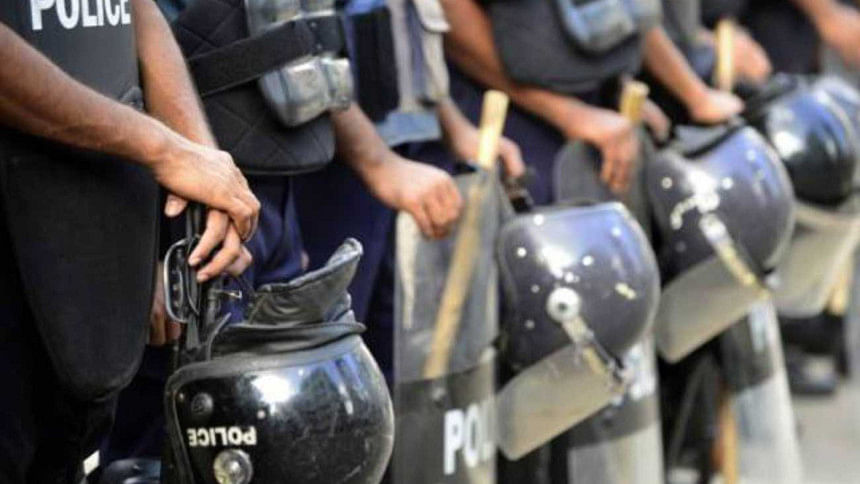Police Week 2017: Of police professional

Police Week 2017 commences from today. It is time to once again dwell on the imperative of police professionalism because to ensure good governance, maintenance of public order and peace are preconditions. In doing so, the rule of law is facilitated that characterises a democratic society.
In our parlance, police professionalism would mean organisational, legal and structural change to improve efficiency and effectiveness of the police to meet contemporary policing requirements based on human rights standards and the principle of rule of law.
The police function is distinguished from all others in the field of public protection and public safety by its reliance upon the minimum and not the maximum use of force, its necessary subordination to the decrees of the courts, its strict adherence to the essential rule of law, and its attachment to the concept of human rights.
The above mentioned functions can be performed by a police force having a self-contained organisational structure where there is no distortion of command and no dilution of accountability.
In view of the above, it is necessary to look at the historical perspective and the objective conditions. The reality is that Bangladesh attained independence after a bloody freedom struggle: it adopted a written, liberal democratic Constitution but retained the colonial administrative, police and judicial structures without recasting them to meet the changed situation. So how does one promote liberalism with a colonial mindset?
To illustrate, the colonial police system operated in the light of the imperial ruler's need to establish a relationship of control, coercion and surveillance over a subject population. The question is how such a system would fulfill the aspiration of an independent democratic polity.
Nearer home in India, where democratic system appears to be firmly entrenched, the situation is grim. K.S. Subramanian, a former officer of the Indian Police Service, in his book Political violence and the police in India comments: "Politicisation, criminalisation, corruption, brutality and human rights violations are eating into its vitals. Public order maintenance and political intelligence collection take up most of the time of Indian police with little left for crime prevention, crime detection and service provision. The police leadership has remained a prisoner of the political party in power at all levels and has failed to contribute to organisational renewal and revitalisation, research and training, and the nurturing of professional skills."
The above reference has been cited to highlight the systemic deficit and to understand what happens when the institution is afflicted by organisational, managerial and policy crises.
Crime management could not be seen in isolation. The reason is simply that the first purpose of the paramilitary police force is to support the state; and their primary role is a political one. The state, rather than the law, is supreme; and the major enemy of the police is the political subversive rather than the criminal.
The organisational objective is important because in the colonial model the policemen are accountable to their superiors, rather than public opinion or the law. Their duties are tabulated for them, and there is little or no room for discretion; clearly, such a police force would dictate a very different relationship between police and society. The distinction between society and State, and between State and government gets blurred.
We have to remember that a police organisation, which is controlled, is a source of great power to its controllers. Therefore, do we see any societal effort to monitor police power carefully and harness it for the good of all? It needs to be remembered that to place police and their power under the sole direction of executive government is to give that arm of government power to enforce its will on society and overrule opposition.
Is it likely that our leaders who came to occupy positions of power after the departure of the British and Pakistanis were enamoured by the administrative and police system left behind by the colonial powers, and enjoyed exercising power and authority, oblivious of their own demand of yesteryears for far-reaching administrative reforms?
Do we witness the public caught in an increasingly norm-free, unpredictable and unjust environment? Who is responsible for transforming policing from the professional imposition of a coherent moral consensus on society into unethical activities?
While the prevalent wisdom of a section of our society to lay all the blame at the door of the politicians is untenable, it is also not in broader public interest to make sweeping observations like "people are not safe even in their bedrooms, rape is common, murders are frequent, mugging is routine like a traffic jam," without the benefit of appropriate analysis and statistics and cognisance of the broader socio-political perspective. It is perhaps time for substantive police reforms to plug the systemic holes, and control the deviants and where necessary to weed out the bad hats.
In the ultimate analysis, the police officials have to demonstrably prove that civil liberty and enforcement efficiency can harmoniously coexist in a people's republic.
The writer is former IG, and a columnist of The Daily Star.

 For all latest news, follow The Daily Star's Google News channel.
For all latest news, follow The Daily Star's Google News channel. 



Comments